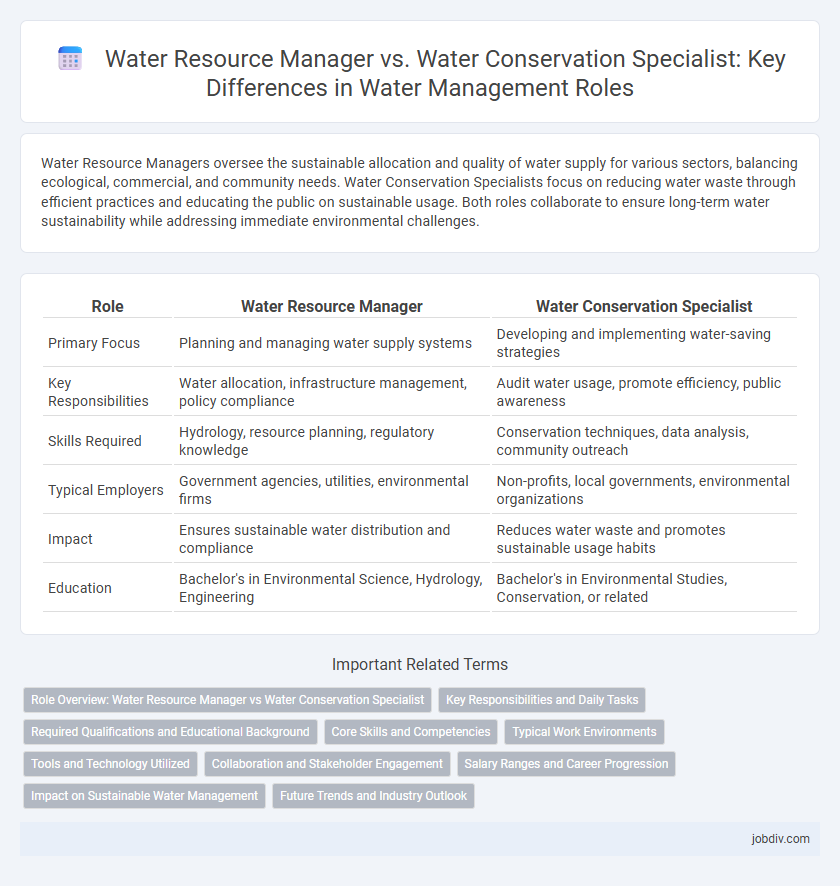Water Resource Managers oversee the sustainable allocation and quality of water supply for various sectors, balancing ecological, commercial, and community needs. Water Conservation Specialists focus on reducing water waste through efficient practices and educating the public on sustainable usage. Both roles collaborate to ensure long-term water sustainability while addressing immediate environmental challenges.
Table of Comparison
| Role | Water Resource Manager | Water Conservation Specialist |
|---|---|---|
| Primary Focus | Planning and managing water supply systems | Developing and implementing water-saving strategies |
| Key Responsibilities | Water allocation, infrastructure management, policy compliance | Audit water usage, promote efficiency, public awareness |
| Skills Required | Hydrology, resource planning, regulatory knowledge | Conservation techniques, data analysis, community outreach |
| Typical Employers | Government agencies, utilities, environmental firms | Non-profits, local governments, environmental organizations |
| Impact | Ensures sustainable water distribution and compliance | Reduces water waste and promotes sustainable usage habits |
| Education | Bachelor's in Environmental Science, Hydrology, Engineering | Bachelor's in Environmental Studies, Conservation, or related |
Role Overview: Water Resource Manager vs Water Conservation Specialist
Water Resource Managers oversee the planning, development, and sustainable management of water resources to meet community, agricultural, and industrial needs, ensuring regulatory compliance and addressing water quality and distribution challenges. Water Conservation Specialists focus on creating and implementing strategies to reduce water usage, promote efficient water consumption, and educate communities on sustainable water practices to conserve local and regional water supplies. Both roles are critical in addressing water scarcity but differ in scope, with managers targeting resource allocation and specialists emphasizing usage reduction.
Key Responsibilities and Daily Tasks
Water Resource Managers oversee the planning, development, and sustainable management of water resources, ensuring compliance with environmental regulations while coordinating with government agencies and stakeholders. Water Conservation Specialists focus on reducing water consumption by designing and implementing conservation programs, conducting audits, and educating communities on efficient water use. Both roles require data analysis and monitoring of water systems, but Water Resource Managers handle broader regulatory and policy frameworks, whereas Conservation Specialists emphasize behavioral change and resource optimization.
Required Qualifications and Educational Background
Water Resource Managers typically require a bachelor's degree in environmental science, civil engineering, or hydrology, with advanced knowledge in water systems management and policy development. Water Conservation Specialists often hold degrees in environmental studies, natural resource management, or related fields, emphasizing skills in conservation practices, public education, and sustainability strategies. Both roles demand proficiency in data analysis, regulatory compliance, and project coordination, with certifications like Certified Water Resource Manager (CWRM) enhancing career prospects.
Core Skills and Competencies
Water Resource Managers excel in hydrological modeling, regulatory compliance, and watershed management, enabling efficient planning and allocation of water supplies. Water Conservation Specialists focus on demand-side management, behavioral change strategies, and implementation of water-saving technologies to reduce consumption. Both roles require strong analytical skills, knowledge of environmental laws, and proficiency in Geographic Information Systems (GIS) for data-driven decision-making.
Typical Work Environments
Water Resource Managers typically work in government agencies, consulting firms, and environmental organizations, managing water supply systems and policy implementation. Water Conservation Specialists are often found in public utilities, educational institutions, and nonprofit organizations, focusing on developing programs to reduce water usage and promote sustainable practices. Both roles commonly operate in office settings, field sites, and collaboration with community stakeholders to ensure effective water management.
Tools and Technology Utilized
Water Resource Managers utilize Geographic Information Systems (GIS), remote sensing technologies, and hydrological modeling software to analyze water availability, distribution, and usage patterns. Water Conservation Specialists employ smart irrigation systems, sensor-based leak detection devices, and water auditing software to optimize water use efficiency and reduce waste. Both professionals leverage data analytics and real-time monitoring tools to support sustainable water management practices.
Collaboration and Stakeholder Engagement
Water Resource Managers and Water Conservation Specialists collaborate closely to balance sustainable water use and ecosystem protection, engaging stakeholders such as local communities, government agencies, and environmental groups. Effective stakeholder engagement ensures policies and projects address diverse needs, fostering cooperation and compliance in water management initiatives. Their joint efforts enhance data sharing, resource allocation, and public awareness to optimize water conservation outcomes.
Salary Ranges and Career Progression
Water Resource Managers earn average salaries ranging from $65,000 to $110,000 annually, reflecting their oversight of water supply systems and regulatory compliance, while Water Conservation Specialists typically make between $50,000 and $85,000, focusing on promoting sustainable water use and efficiency. Career progression for Water Resource Managers often leads to senior roles in environmental consulting, government agencies, or utility companies, whereas Water Conservation Specialists may advance into public policy, education, or resource planning positions. Both roles require expertise in hydrology and environmental science, with salary growth tied to experience, certifications, and geographic location.
Impact on Sustainable Water Management
A Water Resource Manager coordinates large-scale water distribution, infrastructure planning, and policy implementation to ensure long-term sustainability and equitable access to water supplies. A Water Conservation Specialist focuses on reducing water waste through community education, efficiency audits, and promoting water-saving technologies, directly reducing consumption and preserving local water sources. Together, their roles complement sustainable water management by balancing supply optimization with demand reduction strategies.
Future Trends and Industry Outlook
Water Resource Managers and Water Conservation Specialists are pivotal in addressing future demands driven by climate change, population growth, and technological advancements. Emerging trends emphasize the integration of smart water management systems and data analytics to optimize resource allocation and conservation efforts. The industry's outlook projects increased investment in sustainable infrastructure and regulatory support to enhance water security and resilience worldwide.
Water Resource Manager vs Water Conservation Specialist Infographic

 jobdiv.com
jobdiv.com